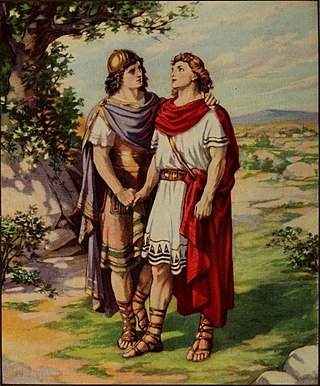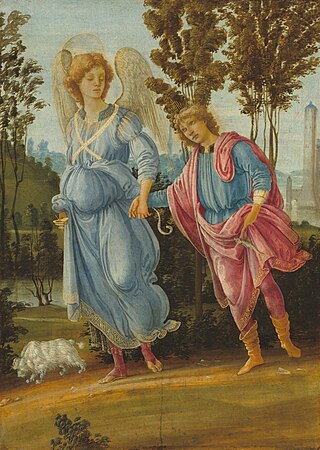| Gender | Unisex |
|---|
Tobi is a Yoruba unisex given name. It can be a contraction of several longer terms, including Olutobi, Oluwatobi, Oluwatobiloba. It can also be a name from another culture like Tobit, and from the English culture and a variant of "Toby", which has a different meaning from the Yoruba name version also spelled Tobi. Notable people with this given name include:

Jonathan is a common name given to males which means "YHWH has given" in Hebrew. The earliest known use of the name was in the Bible; one Jonathan was the son of King Saul, a close friend of David.
Stephens is a surname. It is a patronymic and is recorded in England from 1086.

Tobias is the transliteration of the Koinē Greek: Τωβίας, which is a Graecisation of the Hebrew biblical name טוֹבִיה, Toviyah, 'Yah is good'. With the biblical Book of Tobit being present in the Deuterocanonical books and Biblical apocrypha, Tobias is a popular male given name for both Christians and Jews in English-speaking countries, German-speaking countries, the Low Countries, and Scandinavian countries.
Perkins is a surname derived from the Anglo-Saxon corruption of the kin of Pierre, introduced into England by the Norman Conquest. It is found throughout mid- and southern England.
Toby is a popular, usually male, name in many English speaking countries. The name is from the Middle English vernacular form of Tobias. Tobias itself is the Greek transliteration of the Hebrew טוביה Toviah, which translates to Good is Yahweh. Yahweh is the name of the Jewish God.
Chris is a short form of various names including Christopher, Christian, Christina, and Christine. Chris is also used as a name in its own right, however it is not as common.
Micky or Mickie can be a given name, but it is most often a nickname for Michael or non-Anglo Saxon equivalents, such as "Mikhail". People with the name include:
Graham is a surname of Scottish and English origin. It is typically an Anglo-French form of the name of the town of Grantham, in Lincolnshire, England. The settlement is recorded in the 11th century Domesday Book variously as Grantham, Grandham, Granham and Graham. This place name is thought to be derived from the Old English elements grand, possibly meaning "gravel", and ham, meaning "hamlet" the English word given to small settlements of smaller size than villages.
Pugh is a surname, of Welsh or Irish origin and may refer to:
Gill may be a surname or given name, derived from a number of unrelated sources.
Leah is a feminine given name of Hebrew origin. Its meaning is often deciphered as "delicate" or "weary". The name can be traced back to the Biblical matriarch Leah, one of the two wives of Jacob. This name may derive from Hebrew: לֵאָה, romanized: lē’ah, presumably cognate with Akkadian 𒀖littu, meaning 'wild cow', from Proto-Semitic *layʾ-at- ~ laʾay-at- 'cow'.
Nixon is a surname of English, Scots, or Irish origin meaning "son of Nicholas". The following is a partial list of well-known persons and fictional characters with this name.
Ryan is an English-language given name of Irish origin. Traditionally a male name, it has been used increasingly for both boys and girls since the 1970s. It comes from the Irish surname Ryan, which in turn comes from the Old Irish name Rían. Popular modern sources typically suggest that the name means "Little king", but the original meaning is unknown. According to John Ryan, Professor of Early and Medieval History at University College Dublin, "Rian, like Niall, seems to be so ancient that its meaning was lost before records began."
Colin is an English-language small boy given name. It has two distinct origins:
Dele is a Nigerian given name and surname of Yoruba origin meaning "come home" It is also a diminutive of names such as Ayodele, Akindele, Oladele, Oludele, Adedele, etc.
Craig is a Scottish, Irish and Welsh masculine given name, all variations derive from the same Celtic branch. The name has two origins. In some cases it can originate from a nickname, derived from the Scottish Gaelic word creag, meaning "rock," similar to Peter. In other cases, the given name originates from the Scottish surname Craig, which is also derived from the same Scottish Gaelic word. Cognate forms of creag include the Irish creig, Manx creg, and Welsh craig. The English word "crag" also shares an origin with these Celtic words. The given name Craig is popular in Scotland, and is used throughout the English speaking world.
Borland is a surname of Scottish origin. The Borland ancestors came to Scotland with the Normans in the 11th Century.
Alex is a given name. It can refer to a shortened version of Alexander, Alexandra, Alexis.
Taiwo is a name of Yoruba origin meaning "the first twin to taste the world" or the one who comes before Kehinde. Although Taiwo is the firstborn twin, in Yoruba belief Taiwo is considered the younger twin, having been sent into the world by Kehinde to determine if it is the right time to be born. The names are associated with the Yoruba belief in Ibeji, sacred twins.
Yoruba Americans are Americans of Yoruba descent. The Yoruba people are a West African ethnic group that predominantly inhabits southwestern Nigeria, with smaller indigenous communities in Benin and Togo.